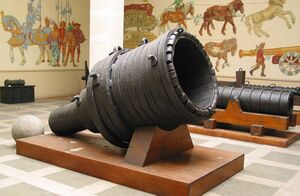Engineering:Pumhart von Steyr
| Pumhart von Steyr | |
|---|---|
 The Pumhart von Steyr in the Heeresgeschichtliches Museum at Vienna | |
| Type | Cannon Artillery |
| Place of origin | Liezen, Styria, Holy Roman Empire |
| Service history | |
| In service | Holy Roman Empire |
| Used by | Habsburg |
| Production history | |
| Designed | Early 15th century |
| No. built | 1 |
| Variants | None |
| Specifications | |
| Mass | ~ 8 t (7.9 long tons; 8.8 short tons) |
| Length | 2,590 mm (102 in) |
| Barrel length | 1,440 mm (57 in) |
| Diameter | 760–880 mm (30–35 in) (conical muzzle) |
| Crew | 4-6 |
| Shell weight | 690 kg (1,520 lb) |
| Calibre | 800 mm (31 in) (ball diameter) |
| Barrels | 1 |
| Rate of fire | 1 round every 2-3 Mins |
| Maximum firing range | ~600 m (2,000 ft) |
| Sights | None |
The Pumhart von Steyr ("Styrian Bombard")[1] is a medieval large-calibre cannon from Styria, Austria, and the largest known wrought-iron bombard by caliber.[2] It weighs around 8 t (7.9 long tons; 8.8 short tons) and has a length of more than 2.59 m (8 ft 6 in). It was produced in the early 15th century and could fire, according to modern calculations, an 800 mm (31 in) stone ball weighing 690 kg (1,520 lb) to a distance of roughly 600 m (2,000 ft) after being loaded with 15 kg (33 lb) of gunpowder and set at an elevation of 10°.[3]
The bombard is today on display in one of the artillery halls of the Heeresgeschichtliches Museum at Vienna.
Besides the Pumhart von Steyr, a number of 15th-century European large-calibre weapons are known to have been employed primarily in siege warfare, including the wrought-iron Mons Meg and Dulle Griet as well as the cast-bronze Faule Mette, Faule Grete and Grose Bochse.
Footnotes
See also
References
- Schmidtchen, Volker (1977a). "Riesengeschütze des 15. Jahrhunderts. Technische Höchstleistungen ihrer Zeit". Technikgeschichte 44 (2): 153–173 (162–164).
Further reading
- Schmidtchen, Volker (1977b). Bombarden, Befestigungen, Büchsenmeister: Von den ersten Mauerbrechern des Spätmittelalters zur Belagerungsartillerie der Renaissance. Düsseldorf: Droste. pp. 33–34. ISBN 3-7700-0471-X.
External links
 |

